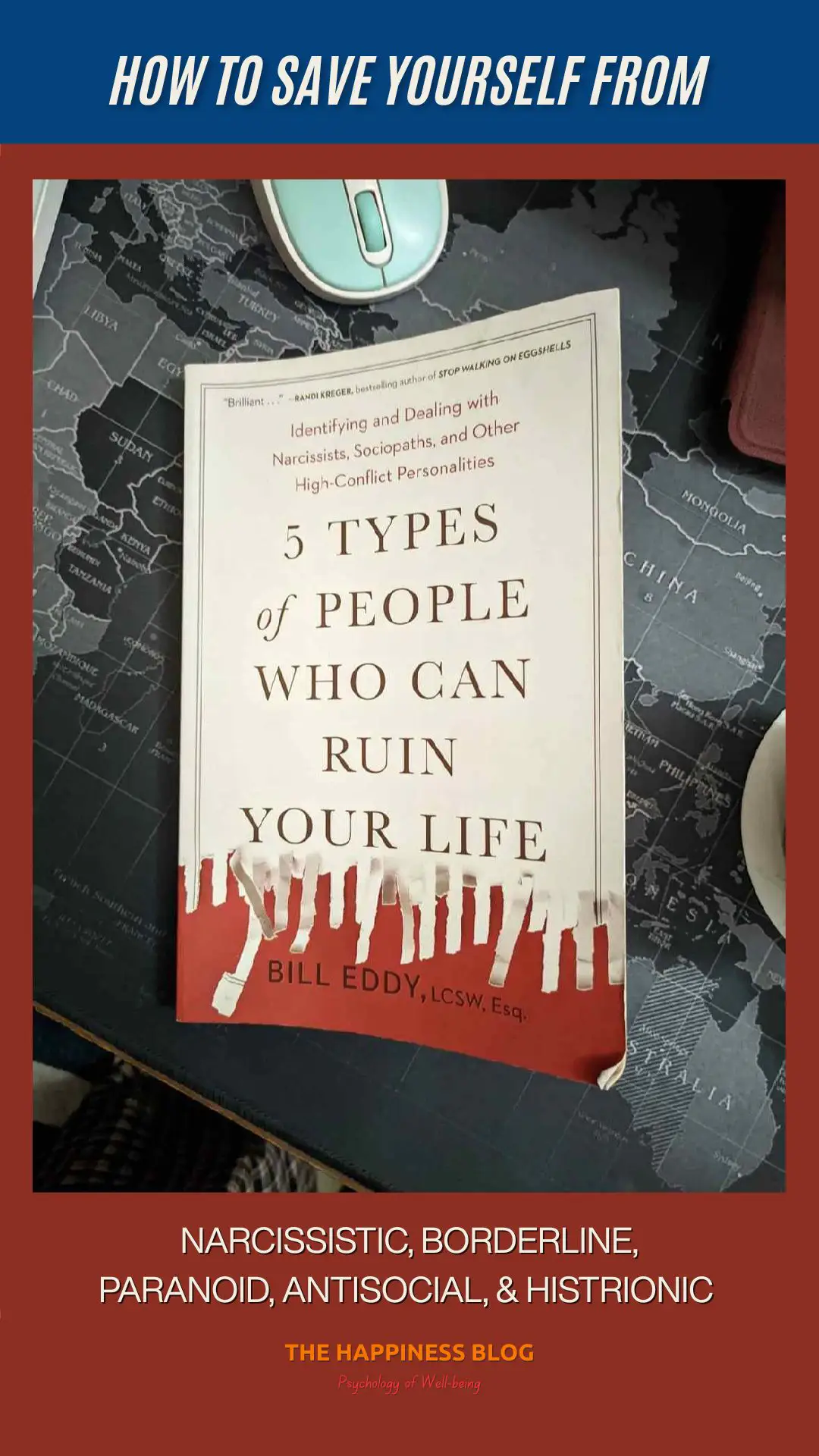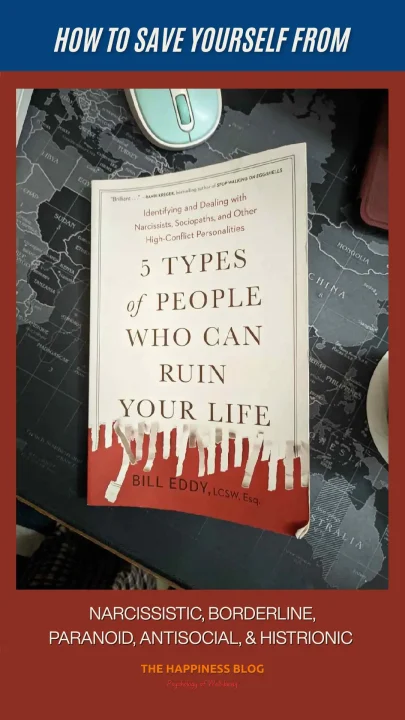Today's Saturday • 9 mins read
Bill Eddy’s groundbreaking book, “5 Types of People Who Can Ruin Your Life,” startles us with this fact:
About 10% of the people in the world are high-dispute personalities (HCPs). That’s roughly 810 million people today.
These people share four main traits:
- Routinely escalate disputes.
- Tend to blame others relentlessly.
- Struggle to regulate their emotions.
- Show extreme behaviors that 90% of people would not.
Once an HCP decides to target you, they can seriously damage your career, relationships, and mental health.
So you need to learn how to spot them and deal with them properly before they make your life chaotic.
5 Personality Types Who Can Ruin Your Life
These five types of people are narcissistic, borderline, paranoid, antisocial, and histrionic personalities.
1. The Narcissistic HCP: “I’m Superior, You’re Nothing.”
Make up 6.2% of the population (62% male).
Narcissistic HCPs center their existence around grandiosity and entitlement.
- Grandiosity is having an unrealistic sense of superiority and self-importance.
- Entitlement is expecting special treatment or recognition without doing anything to deserve it.

They demand constant admiration for their “superiority” while showing little empathy for others. They can exploit every relationship for personal gain.
Over time, they create toxic environments wherever they go. They take credit for their successes, even if those successes were other people’s work, but they won’t take responsibility for their mistakes.
Their default is to blame others for their failures and mistakes.
Their core fear: being seen as inferior or unworthy of admiration.
2. The Borderline HCP: “Love You, Hate You.”
Make up 5.9% of the population (53% female).
Borderline HCPs live in emotional extremes. Their “splitting” behavior means everything is either perfect or terrible in their eyes, with no middle ground.
Their emotional volatility can leave you walking on eggshells, never knowing which version of them you will meet today. They may threaten self-injury during disputes to maintain control.
Whether they idealize or devalue you depends on their moment-to-moment fear of whether you’ll abandon them.
- Idealization is putting someone on a pedestal where they can do no wrong.
- Devaluation is suddenly seeing that same person as completely terrible or evil.
Paradoxically, their intense reactions often create the very rejection they desperately want to avoid. Their relationships follow a predictable yet exhausting cycle of passionate love followed by devastating hatred.
Their core fear: an overwhelming sense of abandonment and being left alone.
3. The Antisocial HCP: “The Cruel Con Artist.”
Make up 1.8% of the population with equal gender distribution.
Antisocial personalities lack conscience, empathy, and remorse. They view people as objects to be used for personal gain, not fellow humans.
What makes them extremely dangerous is that they are “fear-blind.” They have zero fear of the consequences.
- Psychopath eyes are cold, dull, emotionless eyes with an intense, unblinking stare.
- Parasitic lifestyle means living a life exploiting others financially, emotionally, or physically without giving back.
They typically use a magnetic charm to hide their predatory nature. This HCP can hurt anyone or destroy lives without losing sleep.
They lie effortlessly, often about easily verifiable facts, and show no shame when caught. When confronted about their vile acts, they either rage with frightening intensity or disappear entirely.
Their cruelty can be breathtaking. They can abandon their own children or steal from old, vulnerable people without guilt or distress.
Their core fear: being caught or losing control over others.
4. The Paranoid HCP: “The Highly Suspicious Type”
Make up 4.4% of the population (57% female).
Paranoid HCPs live in constant fear of betrayal, deception, and conspiracy, with their world populated by enemies and hidden threats that others cannot see.
Working or living with paranoid HCPs means constant vigilance, as they may suddenly turn against you based on imagined slights or misinterpreted intentions.
- Hypervigilance is constantly scanning every interaction for signs of disloyalty or deception.
- Preemptive strikes mean launching devastating campaigns against people based on imagined threats.
They interpret neutral actions as hostile, remember every perceived slight for years, and hold grudges with frightening intensity. They often interrogate family members about whereabouts or accuse coworkers of sabotage without evidence.
These HCPs can misinterpret your kindness toward them as manipulation. They see hidden agendas where none exist.
Working or living with them means constant vigilance, as they may suddenly turn against you based on imagined slights.
Their core fear: betrayal and being conspired against.
5. The Histrionic HCP: “The Dramatic Accuser.”
Make up 1.8% of the population.
Histrionic HCPs live for attention and will create elaborate dramas to secure it, with their core fear of being ignored driving them to increasingly theatrical displays.
- Emotional lability means their intense emotions shift rapidly and tend to be shallow rather than deep.
- Theatrical behavior involves turning minor inconveniences into major catastrophes, complete with tears, accusations, and public scenes.
Histrionic HCPs crave attention and create drama to get it. They may lie about being ill or invent emergencies to stay at the center of attention.
They can turn minor situations into major crises. Their constant demands for emotional validation and theatrical displays exhaust those around them.
They excel at getting other people involved in their emotional storms, turning family and friends into supporting actors in their ongoing drama.
They’re overly emotional, easily influenced, and struggle to form deep relationships because their focus remains on performance rather than authentic connection.
Their core fear: being ignored or overlooked.
Reading The Red Flags: The WEB Method
Bill Eddy developed the WEB Method to help spot HCPs early on:
- Words: Listen for all-or-nothing statements, excessive blame, and extreme language. HCPs speak in absolutes and rarely take responsibility for things gone wrong.
- Emotions: Pay attention to your emotional reactions. Do you feel anxious, uneasy, or confused? Does something seem “too good to be true”? Your intuition (fear response system) often senses danger before your conscious mind does. So, heed your gut feelings.
- Behavior: Watch for inappropriate or outrageous actions that violate social norms. HCPs consistently cross boundaries of decency and proper behavior. Ask yourself, “Is this person doing what 90% of people won’t do?” If you answered yes, you should be on guard.
⚠️ Warning Box:
The 90% Rule: Your Early Warning System
If someone does something that 90% of people would never do—like explosive anger over minor issues, public shaming, or extreme threats—they’re likely an HCP. Trust this instinct; it’s your brain recognizing dangerous patterns.
Protecting Yourself: Essential Strategies
1. Never Label Them
The fastest way to become an HCP’s permanent enemy is to tell them what they are. Avoid saying “you’re a narcissist” or similar labels. They will never forgive or forget this direct raid on their self-image.
2. The BIFF Response Method
When HCPs strike or spread false reports about you, respond with BIFF:
- Brief: Keep your responses to 2-3 sentences maximum.
- Informative: Stick to facts, avoid emotional language.
- Friendly: Maintain a neutral, courteous tone.
- Firm: Be clear with no opening for debate.
3. Use Bill Eddy’s CARS Approach
For unavoidable HCP relationships (family, coworkers), Eddy suggests using CARS:
- C – Connect: Show limited empathy, attention, and respect.
- A – Analyze: Understand their specific triggers and patterns.
- R – Respond: Address issues calmly without emotional confrontation.
- S – Set Limits: Establish clear boundaries with defined consequences.
4. Special Advice for Each Type
- With Narcissistic HCPs: Maintain respectful communication. Offer them limited choices. Set firm boundaries with them based on rules rather than personal preferences. Never challenge their superiority directly.
- With Borderline HCPs: Maintain consistent, predictable responses. Avoid getting pulled into their emotional storms or trying to rescue them from consequences.
- With Antisocial HCPs: Exercise extreme caution. Consider this the most dangerous relationship type. Verify everything they say, maintain safety plans, and keep distance as much as possible.
- With Paranoid HCPs: Avoid excessive friendliness (they’ll see it as manipulation), be straightforward, and don’t try to convince them their suspicions are wrong.
- With Histrionic HCPs: Don’t reward their dramatic behavior with attention, stay calm during their highly emotional displays, and redirect conversations to practical matters.
🛡️ Strategy Box:
Boundary Setting Essentials
- Set boundaries early and maintain them consistently.
- Base boundaries on policies/rules, not personal opinions.
- Offer limited choices to give them a sense of control.
- Never negotiate on safety or core values.
- Document interactions when necessary.
When Should You Seek Help
Involve professionals experienced with dealing with highly contested disputes and relationship abuse resources.
- Reach out to an abuse-support helpline or law enforcement when your physical safety is at risk.
- Consult attorneys experienced with high-dispute personalities during legal proceedings involving HCPs.
- Take the matter to a human resources department or employment lawyer when workplace harassment escalates.
- Seek help from mental health professionals or trauma therapists if you’re experiencing trauma symptoms from the relationship.

The Path Forward
Living with or around HCPs requires a fundamental shift in thinking.
You cannot change them, fix them, or convince them to see reason. Your power lies in protecting yourself, setting boundaries, and choosing your level of engagement.
It helps to remember that HCPs often target people who are naturally empathetic, helpful, and dispute-avoidant. Having these qualities, which are valued in healthy relationships, makes you vulnerable to an HCP.
💚 Recovery Box:
Healing After HCP Damage
- Practice self-compassion—don’t blame yourself for their behavior.
- Rebuild your sense of reality through trusted relationships.
- Seek therapy to process any trauma or manipulation.
- Reconnect with your values and authentic self.
- Trust your instincts moving forward.
Final Words
Identify the toxic 10% and respond to them with your safeguards on. All along, don’t push away the other 90% who support your empathy and kindness.
Use your wisdom to become less vulnerable, not too cynical about humanity.
Research shows huge individual differences exist in how people respond to their environment; some show remarkable resilience, emerging from negative experiences relatively unscathed (Rutter, 2005).
Not everyone born with neurological differences linked to psychopathy will break laws or violate social rules. Many psychopaths live and function normally in society.
√ Also Read: Gift of Fear: 7 Pre-Signs of Dangerous People
√ Please share this with someone.
» You deserve happiness! Choosing therapy could be your best decision.
...
• Disclosure: Buying via our links earns us a small commission.
